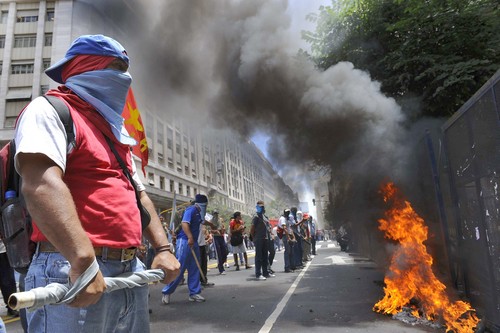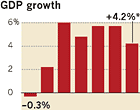
(above) Demonstrators brandishing clubs gather at the offices of Spanish-Argentine oil company Repsol in Buenos Aires on Friday, demanding nationalization. Battered economies threaten to make Latin American populations restive.Daniel Garcia / AFP/Getty Images
Latin nations fight economic slump with stimulus
The region had been enjoying a commodities-driven boom. Measures' success may hinge on a global recovery.
December 16, 2008 - Los Angeles Times
By Patrick J. McDonnell and Chris Kraul
Reporting from Bogota, Colombia, and Buenos Aires -- Facing an economic slowdown after years of brisk growth, Latin American nations from Mexico to Argentina have launched stimulus plans amid fears of recession, rising poverty and social unrest.
Central banks have moved to stabilize currencies, boost employment and bolster consumer confidence in an attempt to limit the fallout from the global economic crisis.

Latin American gains in danger
Brazil, the region's largest economy, has pumped tens of billions of dollars into shoring up its currency and once-booming housing and auto sectors, while announcing an additional $3.6 billion in tax cuts last week, along with $10 billion in credit for indebted Brazilian firms.
Mexico, dependent on the flagging U.S. economy, has backed loans to small and medium-size companies.
"We are taking every action to mitigate the negative impact of the global economic situation on our country," President Felipe Calderon declared.
However, the Mexican central bank estimates that gross domestic product could grow less than 0.5% next year, down from an expected 3% rate in 2008. Remittances from people in the United States have been dropping, one indication of how hard times north of the border affect Mexico.
Oil-rich Venezuela, faced with a big drop in crude prices since summer, is contemplating budget reductions that analysts say could throttle the free-spending ways of President Hugo Chavez and heighten opposition to his administration.
Ecuador has also been hurt by falling oil prices. On Friday, President Rafael Correa followed through on his oft-repeated threat to default on his nation's foreign debt, announcing that he would skip a $30.6-million bond interest payment this week. Correa said he was stiffing bondholders not as a result of economic conditions but because the debt taken out by a prior government was "illegitimate."
Even Peru, with one of the hemisphere's fastest-growing economies (thanks largely to mineral exports to China and elsewhere), has unveiled a $3.2-billion stimulus program.
"We all have to respond to the crisis," said Peruvian President Alan Garcia, outlining a wide-ranging package of social spending, infrastructure projects and business credits in a nation whose growth had been cruising along at 9%.
Experts have praised Latin American officials for acting forcefully, but it remains unclear what success they will have. Much will depend on the prospects for a global recovery, analysts say.
Some view the assorted stimulus plans as populist measures meant to shore up political support but lacking in long-term substance, and possibly harmful.
"I don't think it's going to work," Roberto Padovani, with West LB investment bank in Sao Paulo, said of Brazil's latest stimulus blueprint. "The volume of fiscal spending is not enough to offset the international crisis impact. The government is just trying to show it's doing something regardless of negative longer-term effects on inflation and the currency. It's a wonderful economic mistake."
Presidents such as Brazil's Luiz Inacio Lula da Silva -- who initially said their economies were inoculated against the U.S.-born financial malady -- have made an abrupt about-face. While repeating last week that "the crisis wasn't caused by us," Lula conceded the interlocking nature of the global economy as word of layoffs, a slumping currency and reduced export revenue unsettled Brazil.
Many worry that the slowdown could jeopardize the social gains in Latin America since 2002, when the worldwide commodities boom ushered in one of the region's most sustained eras of growth. Nations such as Brazil that have invested heavily in curtailing hunger and poverty will probably have fewer funds for such social spending, analysts say.
The percentage of Latin Americans in poverty fell to 33.2% this year compared to 44% in 2002, according to a United Nations study released last week. Unemployment dropped to 7.5%, down from 11% in 2002. But the picture has rapidly turned gloomier.
"We don't think unemployment will go down in 2009, and it might even go up," said Martín Hopenhayn, a U.N. economist based in Santiago, Chile.
Among the nations taking the most dramatic and controversial actions has been Argentina, where memories of the 2001-02 economic meltdown and default remain fresh.
The nation's lower house of Congress approved a series of tax breaks last week aimed at encouraging the repatriation of tens of billions of dollars in offshore assets. Critics say the plan could increase money laundering while doing little real good because many Argentines have scarce faith in the government and banks and prefer to keep their savings abroad.
President Cristina Fernandez de Kirchner also unveiled a $90-million loan program for the hard-hit tourism industry. That comes on top of a multibillion-dollar public-works program and subsidized loans for auto purchases. She also nationalized $30 billion in private pensions in a move that spooked investors and sent the stock market tumbling.
Detractors labeled the moves empty gestures meant largely to calm jittery nerves and bolster government coffers in advance of next year's midterm elections, in which her ruling Peronist party faces serious challenges.
"I don't think things are going to get much better in the next year," said Andres Telesca, who runs a small Argentine publisher of religious texts that has laid off employees because of plunging sales and tight credit. "The damage has already been done, and it will take years to get back to where we were."
Six consecutive years of rapid growth -- spurred in large part by a boom in prices for soybeans and other exported foodstuffs -- failed to uproot a deep distrust of government among Argentines scarred by their nation's long history of economic and political turmoil.
Even during the recent boom, many citizens believed the government was manipulating numbers to make annual inflation rates appear below 10% -- less than half what economists said was the actual level.
"I have little faith in this government," said Roberto Lisandro Lopez, a restaurant worker in Buenos Aires, where about 300 eateries have reportedly closed since the financial crisis struck in October. "I seriously doubt the things they are announcing will do much to help the local economy."
McDonnell and Kraul are Times staff writers. Contributing to this report were Andres D'Alessandro of The Times' Buenos Aires Bureau, Cecilia Sanchez of The Times' Mexico City Bureau and special correspondents Marcelo Soares in Sao Paulo and Mery Mogollon in Caracas, Venezuela.